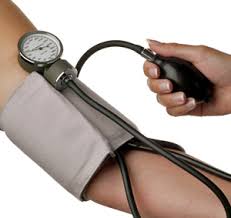 High blood pressure (BP) or hypertension is considered a high risk factor for heart attacks and strokes as well as kidney failure. Many have high BP, but most don’t know as it doesn’t usually have its own symptoms.
High blood pressure (BP) or hypertension is considered a high risk factor for heart attacks and strokes as well as kidney failure. Many have high BP, but most don’t know as it doesn’t usually have its own symptoms.
Blood pressure readings are in two sets of numbers. The top number, systolic pressure, indicates pressure on the artery walls when the heart beats. The lower number, diastolic pressure, shows the pressure on artery walls between heart beats.
A normal reading is 120/80. Above those numbers up to 140/90 is considered pre-hypertension while above 140/90 is hypertension. But people with normal health in the pre-hypertension zone are not considered at risk for strokes, heart, or kidney failure.
Those who are overweight or diabetic are more at risk with higher than normal BP. Over half of the high BP population is diabetic. Men are more likely to have high BP, and those who smoke and drink alcohol excessively are more likely to have high BP.
Pharmaceutical medications with decongestants, NSAIDs (non-steroid ant-inflammatory drugs), such as ibuprofen, steroids, birth control pills, and antidepressants are likely to raise blood pressure. Mainstream medicine considers salt/sodium consumption as a main factor of high BP.
But processed and fast foods account for over 80 percent of the sodium intake using toxic processed salt, mixed with other health damaging additives such as HFCS and trans-fatty acid oils, which are more responsible for causing high blood pressure than pure, unprocessed sea salt.
Foods that can help reduce high blood pressure
Continue reading →
Mike Barrett – According to a study published in the Journal of the American Heart Association, 97% of Americans have poor heart health. Seeing as America ranks last when compared to 16 other comparable countries, it is no surprise to see that only 3% of the U.S. population have healthy hearts.
